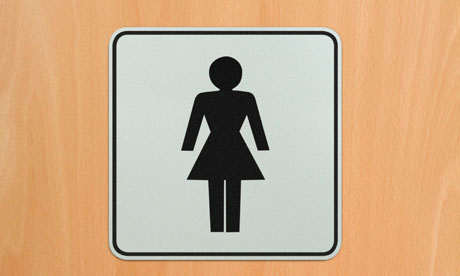
I've suffered from anxiety and depression since the age of 10 – around the same time that I realised I was transgendered. I've spent nearly two decades trying to understand the relationship between the two. As I explained in my last blog, the World Health Organisation classifies gender dysphoria as a mental illness, and in Britain, transsexuality is treated through mental health services. But our complex relationships with our psychologies begin long before we enter the gender reassignment pathway and fret about whether or not the gatekeepers will judge us mentally fit to transition.
The second I recognised my gender dissonance, I knew my life would become harder. At school, I was terrified of those close to me disowning me if it became public knowledge (let alone what those who weren't might do). This fear grew largely from internalising media reports that presented transsexual people as misunderstood social pariahs – at best. I knew no transsexual people, and, pre-internet, I didn't know where I might find any, or hear their perspectives on life. In Section 28 era Britain, sexual or gender difference wasn't seriously discussed in the classroom, so I had no outlet – except, maybe, my friends. The only time we saw someone transgendered, they pointed and laughed at her. I kept silent.
Leaving school, coming out and finding new friends dispelled my anxiety for a while. But, unable to fit into any LGBT community and still struggling with the exact nature of my gender besides the other stresses faced by most twenty-something graduates – dead-end job and financial difficulties – I started counselling, unpacking my adolescent fear, frustration and paranoia, and used exercise to curb my depression. The anxiety remained, seemingly ingrained within my psyche: I'd hoped that coming out as transsexual to friends and family might temper it, but the trials of passing and finding employment, as well as negotiating NHS gender services, meant I merely swapped one set of worries for another.
Regular readers will have noticed that, so far, my transition had gone as well as I could have asked. I'd never expected it to resolve my long-standing mental health issues, though – simply that it might make them easier to address. Sure enough, I understood my anxiety and depression far better than before transition, finally realising that they might be chemical rather than (or as well as) psychological. Still, I was reluctant to seek out medication for fear that it would complicate any hormone prescription.
I saw my GP, who had me fill out the HAD scale: I was amazed at how much worse my results were than before my pre-transitional psychiatrist assessment. A year before that, I was prescribed antidepressants, but did not take them as the possible side effects included depression and suicidal thoughts. "Why risk making it worse?" I asked myself, leaving the tablets unopened. Now, I thought "I have both anyway – what's to lose?", asking the doctor if my 20mg Citalopram prescription would affect my oestrogen treatment. "No," he said, "but you must tell Charing Cross."
The prescription was too strong. My depression and anxiety improved but my energy levels dropped dramatically and my dreams became terrifying. In one, I was chased by Frankenstein's monster: although I'd not consciously questioned myself too frequently whilst living as female, the self-doubt and isolation fostered by the lengthy period I'd spent between male and female (before even starting on hormones) was manifesting itself in my nightmares.
I'd internalised my frustration as everyday activities became increasingly complicated. Needing to keep fit, I reluctantly decided not to present as female for football, as either changing room offered considerable challenges – and 'passing' would be impossible when using the showers afterwards (on the pitch, my passing recalls Zidane in his prime, before you say it). The sports centre receptionist demanded identification. "That's not you," she said, reading my bank card. "I'm transsexual." She stared. "Pre-op." She took my money, eyeing me suspiciously. My friends asked what held me up. "Nothing," I said. After several such encounters, I quit, counting my blessings that my every use of a public toilet had not become similarly fractious – unlike for some.
I got my dose lowered. The vivid dreams stopped, my energy levels slowly rose and I felt much better equipped to deal with whatever life threw at me. By now, I'd found that, mostly, my fears had been worse than my real life experience, and as my key relationships gradually settled, my happiness increased.
Some people do lose family, friends, lovers, jobs, houses and/or security on transitioning, however, exacerbating the internal traumas that precede their coming out (sometimes worsened by religious or political beliefs) and the effects of a lifetime in a body that doesn't suit them. It's unsurprising, then, that transgendered people without access to support have harmed themselves, sometimes fatally, as they struggle to fight their impulse – whatever causes it.
Some of us find the strength to come through this and realise ourselves in adulthood. We enter a second puberty, publicly, facing the inevitable abuse, relationship complications, large expenses needed to access necessary treatment, the anxiety that comes with entering any gendered space, constant (and often interlinked) criticism of our appearances and undermining of our identities. That's purely in our personal lives, ignoring a media that frequently characterises us as unstable and obsessed with how we look.
Many people are reluctant to get help because we live in a world that stigmatises mental health problems, even though approximately one in four experiences them at some point. If we overcome this double stigma, we may find that mental health professionals aren't trained to meet our needs – the few LGBT-specific services in existence are under threat of government cuts.
And if we complain about any of this, however bad it gets? We're over-sensitive, too thin-skinned, and brought it on ourselves. To paraphrase one of my favourite filmmakers: it's not the transsexual who is perverse, but the society in which s/he lives.

